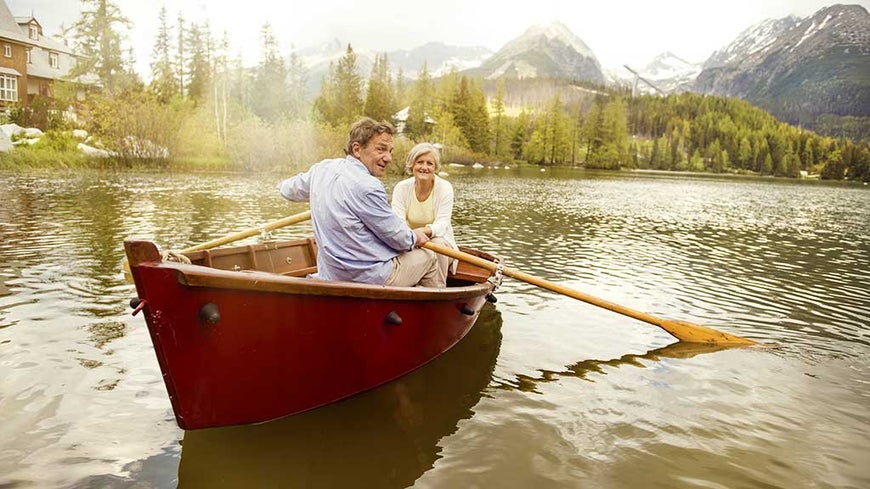Tips for looking after your health while travelling

No matter what age you are and no matter where you're going, it's important to take care of yourself when travelling. People who travel overseas have up to a 50% chance of suffering a travel-related sickness1, and while most illnesses are minor, some unlucky travellers can contract some serious infectious diseases.
When you travel abroad, you leave behind Australia's support systems, emergency service capabilities and medical facilities. The Australian Government will do what it can to help Australians in difficulty overseas, but there are legal and practical limits to what can be done to assist. Your best bet is to keep yourself as safe and as healthy as you can.
Before you go
Essential pre-planning
All travel plans should be considerate of your health and safety. Pre-trip planning is essential and some suggestions include:
- Consulting with your travel agent for suggestions of destinations, or seeking out tour operators that specialise in accommodating the needs of travelling seniors
- Finding out about the medical facilities in the areas you will be visiting
- Researching climate, language and culture
- Making early arrangements for a wheelchair if required
- Organising travel insurance, including covering pre-existing illness if needed
- Preparing yourself for increased physical activity with gentle exercise
- Making sure your accommodation is screened off to mosquitoes and offers air-conditioning
Visit your doctor
Make an appointment with your GP to:
- Undergo a complete medical check up (this is especially important if you have heart disease, hypertension or any other chronic condition)
- Discuss dietary changes
- Discuss staggering medications to fit with new time zones
- Get your flu and pneumococcal vaccination
- Arrange any vaccines or boosters required for your chosen destination
Be sure to visit your doctor at least 6-8 weeks before you travel to allow time to complete any vaccination schedule you may need to undertake.2
Packing considerations
Pack luggage with built-in wheels carefully and include:
- Any regular medications in your carry-on luggage
- Painkillers, antacids, insect repellent, SPF30+ sunscreen and bandaids
- A pillbox to help you monitor the days of the week (being out of routine can be confusing!)
- A spare pair of glasses if required
Preparing to fly
If taking a flight, prepare yourself by:
- Wearing loose clothing
- Drinking plenty of fluids and avoiding alcohol
- Avoiding cigarettes
- Familiarising yourself with stretches and exercises you can perform on the plane
While you're away
Dealing with jetlag
Jetlag is the uncomfortable aftermath of a long flight through several time zones. It is caused by the individual's daily rhythm of activity being disrupted and can result in fatigue, disorientation, sleep difficulties, impaired concentration and physical performance, anxiety, loss of appetite and constipation.
While there are steps to ease jetlag, such as getting a good night's sleep the night before you travel, it's important not to make too many commitments for the first 24 hours following your arrival.
Eating and drinking safely
The most common travel-related illnesses are gastrointestinal diseases, usually picked up from poorly prepared foods or untreated water3. To reduce your chance of getting sick, always wash your hands with soap and running water before eating or preparing food, after going to the toilet or after touching animals. If you are worried about the water, consider moist hand wipes followed by an alcohol-based hand rub. Other tips include:
- Use boiled or bottled water or water purifiers, even when brushing teeth
- Avoid ice in drinks
- Avoid unpasteurised milk and dairy products
- Avoid fruits and vegetables that have been washed in local water or consider eating thick-skinned fruit and veg you can peel yourself
- Avoid shellfish
- Ensure food is cooked through and eat whilst hot
- Avoid street stalls
Avoiding insect bites
Some serious infectious diseases such as malaria, yellow fever and dengue fever can be transmitted via an insect bite. To best avoid them, try:
- Wearing mosquito repellent that contains at least 30 percent DEET4 and reapplying regularly
- Covering as much skin with clothing as possible
Yellow fever is a fatal viral infection spread by mosquitoes. Check requirements for Yellow Fever vaccination for all of the countries you are visiting, and discuss the requirements with your doctor.5
Avoiding flu and other contagious diseases
Influenza is a viral infection that affects mainly the nose, throat, airways and, occasionally, lungs. The virus is transmitted easily from person to person via coughing and sneezing, and while common in Australia during the winter months, epidemics of influenza can occur year-round when travelling. Close contact with others that are sick can put you at danger of contracting the illness yourself, particularly true when in confined spaces such as a cruise ship. If taking a cruise and you notice a fellow passenger is sick, let the cruise staff know right away.
Contact with animals
Zoonotic diseases are infectious diseases and can be passed on from animals and their environment. Animals can carry a range of microorganisms harmful to humans without presenting signs of sickness. To stay safe:
- Avoid contact with any animals (including domestic animals such as cats and dogs)
- Avoid contact with animal waste and saliva by avoiding touching areas where animals have been
- Don't carry food in areas where there are monkeys
- Don't focus attention on animals carrying their young
- Don't visit farms or live animal markets in regions with known avian influenza
If you suffer a scratch from an animal or an animal licks a wound on your skin:
- Immediately wash the area with soap and water for about five minutes.
- Apply antiseptic solution or alcohol to the area
- Promptly visit a doctor for treatment and assessment
While your health shouldn't get in the way of your overseas fun, it is something you should consider while travelling in your senior years. Wise preparation will ensure you're in for a hassle-free, safe adventure.
12 Apr 2016